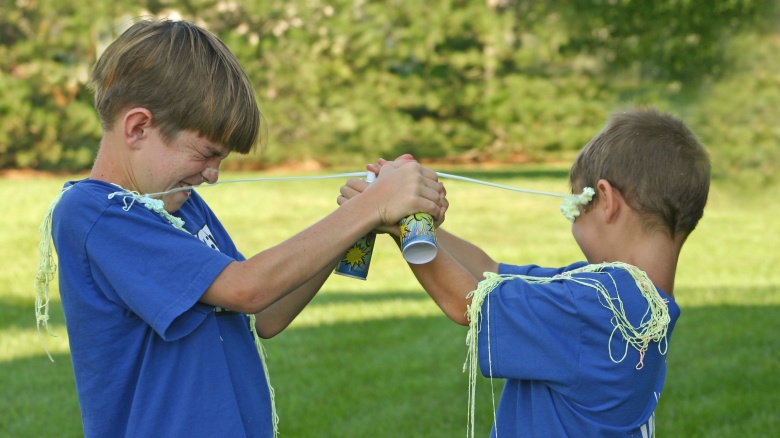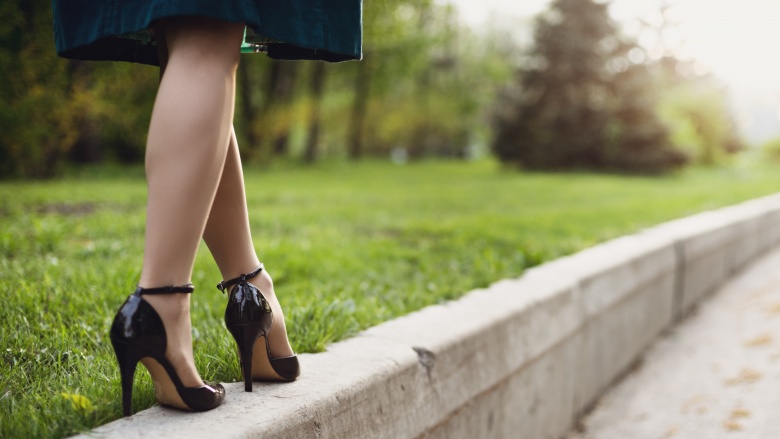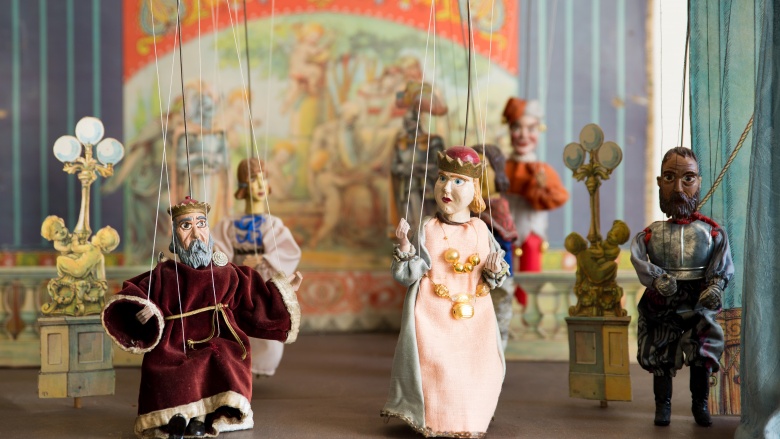The Weirdest Local Laws In The US
Chances are pretty good that you can quote at least a handful of the weird, strange, and outright stupid local laws that made it into legal statutes across the United States. Unfortunately, a lot of them are outright false, nothing more than urban legends perpetuated by the re-telling. We're not blaming anyone here. They're often too good not to share, like the one about old brothel laws applying to sorority houses. It's just not true, as hilarious as it would be.
But government is weird, and the local laws they pass are often even weirder. We wanted to find ones that we could confirm are true, so we put on our investigative journalism hats and started sifting through bylaws and city administrative codes across the country to find (and confirm) these gems of legal wisdom.
Silly String in Southington, Connecticut
The 1995 Apple Festival of Southington, Connecticut was apparently a scene of wanton disregard for all that's good and decent in life. After a handful of local kids covered the town square with Silly String, and nearly caused a major accident when they sprayed two motorcycle police officers, the town elders went on a crusade against the product. The sheriff was quoted in the Lawrence Journal-World as saying, "This product has no legitimate use. It's being manufactured and sold with one purpose in mind — to annoy other people."
Around four months later, people were still arguing about all the good and bad things that went along with Silly String. They weren't messing around, either, and the original ordinance put before the council made Silly String a controlled substance. A less harsh rewrite simply banned it from all public places (and established a penalty of a $99 fine), all in spite of some concerns that the ban would cramp the style of the Apple Festival. Around 30,000 cans of the admittedly annoying stuff were sold every year at the festival, and vendors were the least happy of all.
High heels in Carmel-by-the-Sea, California
This local law sounds goofy, but in context, it sort of makes sense. Carmel-by-the-Sea is a small, beachside community on the Monterey Peninsula, and they pride themselves on being everything a California community should be. They welcome dogs everywhere, they have regulations that encourage keeping the place looking quaint and rustic, and they're incredibly proud of their so-called urban forest. That all means that walking through the village isn't like walking through your typical resort town, and in order to keep pedestrians safe, they issued a ban on all shoes with heels higher than two inches or with less than one square inch of surface area that comes in contact with the road.
Anyone who wants to wear footwear outside of those regulations can apply for a permit from the City Clerk, which essentially absolves the city of all liability should anyone twist an ankle or break their neck.
Standing while drinking alcohol in Woburn, Massachusetts
The city of Woburn, Massachusetts has several pages of rules and regulations that govern what goes on inside restaurants and other sorts of entertainment halls that serve alcohol. Most are pretty normal, making it clear that minors aren't to be served, and neither are people who are already drunk.
It's where drinks make the journey from bartender to customer that things get a little weird. According to city bylaws, only the first server to take a drink from the person behind the bar who made it can actually take it to the customer. Then, that customer must be seated in order to receive their drink, and in order to actually drink it they need to be seated as well. Drinking while standing up is illegal, at least, outside of areas specifically designated by an Approved Standing license. That license has to be clearly posted, with a diagram of the standing area, along with specifics as to how many people can drink while they're standing.
Reptiles at Mardi Gras in New Orleans, Louisiana
New Orleans is a weird place at any time of the year, and it gets extra weird during Mardi Gras. In order to keep things around at least a baseline level of chaos, there are a handful of statues on the books that really make you wonder what the heck happened that they needed to be specified in the first place.
Reptiles are banned from participating in or being near Mardi Gras parade routes, and by law, they must vacate the area 200 yards to either side of the parade route from two hours before the start of the parade until at least an hour after the parade ends. In addition, all floats must have a "No Smoking" sign affixed to them, and there's a massive list of things that absolutely cannot be thrown from floats, including live (or dead) animals, bombs, anything with sharp points, or corrugated cardboard. Silly String is also banned from Mardi Gras (so Southington partygoers will feel right at home), along with both smoke and stink bombs.
Happy Meals in San Francisco
In 2011, San Francisco put a ban on the best thing about going to McDonald's. Children could no longer look forward to getting a free toy in their Happy Meal, unless the fast food giant changed their ways to make their Happy Meals fall within some nutritional guidelines. Basically, to reinstate the free toy policy, the meals would need to be less than 600 calories, contain half a cup of fruit, and three quarters of a cup of vegetables. Since fries don't count as vegetables (stupid starches) and no kid wants half a cup of pickles on their burger, the toy remained tantalizingly out of reach.
Kind of. Parents could request a toy to buy, and it would cost them a whopping 10 cents. Hooray for loopholes!
The law was originally directed toward McDonald's, but around 50 fast food restaurants in the San Francisco area were also impacted by the ban. When researchers took a look at changes that had been made since the ban they found that kids' meals were, on the whole, healthier, but how much influence the banning of the toy had on anything was still debated.
Confetti in Mobile, Alabama
Mobile has joined Southington in banning fun. Buried in the city's laws is a code that not only makes throwing confetti illegal, but also the possession, storage, manufacture, and sale of it. It's also illegal to give the stuff away, so if you even handle it, you're breaking the law.
The provision is cross-referenced with the city's massive section on what constitutes littering, and we get that makes sense. No one wants confetti-covered streets days after a holiday, and Mobile takes confetti seriously. It's even mentioned in their laws governing just what you can and can't do during a Mardi Gras parade. While it is perfectly acceptable to throw serpentine, candy or trinkets in the street during Mardi Gras, but confetti is a different matter entirely, and is absolutely illegal on any day of the year.
Molesting butterflies in Pacific Grove, California
Since 1939, the city of Pacific Grove, California has had a law on the books protecting the world's least offensive flying insect. Anyone who gets caught "molesting" a butterfly in any way is subject to a whopping $1,000 fine, and the law is strictly enforced by the city's police force.
As weird as it sounds to outlaw "molesting" a flying caterpillar, here's actually a good reason for this law. Thousands and thousands of monarch butterflies arrive in the city starting in October, and they spend the winter months clustered in palm and eucalyptus trees. The town's nickname is Butterfly Town, U.S.A., and residents voluntarily created an extra tax to help pay for the establishment and support of a butterfly sanctuary. The butterflies that make it to their sunny California winter home have traveled as far as 2,000 miles, and likely were never there before. Entire generations of butterflies live and die before their offspring finally make it to Pacific Grove, so they're entitled to a little rest and relaxation.
Sad faces in Pocatello, Idaho
Pocatello is proud to be the U.S. Smile Capital, and they take their smiles so seriously that it's illegal to have any other kind of expression on your face.
This law is, at least, admittedly tongue-in-cheek. The ordinance was passed by Mayor George Philips in 1948, after a particularly long, dark, and harsh winter had wiped the smiles off everyone's mugs. The so-called Smile Ordinance was established, and we figure it was actually slightly amusing for approximately 4 seconds. It seems to have faded into relative obscurity until it was featured in a story in the Idaho State Journal on what was presumably a slow news day in 1987. The idea was picked up by the American Bankers Association, who not only declared the city America's smile capital, but used it in a nationwide advertising campaign.
Ugliness and disfigurement in Chicago, Illinois
Chicago isn't the only city to have enacted so-called Ugly Laws (San Francisco did, too), but the Windy City's laws are particularly notable for their longevity. The idea started in 1881 with the Alderman James Peevey. He had a beef with the city — specifically, he didn't like the people he described as "diseased, maimed, mutilated, or in any way deformed, so as to be an unsightly or disgusting object". He was horrified to see so many of them on the city streets, spending most of their time begging and using their disabilities to appeal to the giving and charitable nature of non-ugly people.
Punishments were strict, and offenders were fined as much as $50 before being shipped off to the poorhouse. The street clean-up was needed, city officials said, because unsightly people out in public might incite class violence or, more worryingly, might scare the ladies. As time passed, the law became justified in more and more ways. Those who were poor or disfigured through bad luck or circumstance were deemed more worthy of help at the end of the 19th century, and it was only the return of disfigured veterans from the World Wars started a shift in public opinion. The laws stayed on the books until 1974.
Dancing in Pound, Virginia
It might bring back memories of watching a cheesy '80s movie, but at least one town in Virginia really did ban dancing. The ordinance made dancing illegal, and anyone who did want to dance needed to apply for a permit from the town's very religious Council. The town's elders weren't worried about the dancing, per se, but rather the drinking, lewd behavior, and ultimate breakup of marriages that would inevitably come of it.
According to the law, the town reserved the right to refuse a permit to anyone who wasn't of good moral character, and they would also need to consider where the dancing would take place. If you were looking for permission to dance anywhere near a school or church, or near a place that also served alcohol, you were out of luck. The Council also reserved the right to revoke a permit any time they got word that there was the least bit of unholiness going on, and once a permit was denied, it couldn't be applied for again for six months.
It applied to all sorts of dancing, too. Even a performance of The Nutcracker needed to apply for permissions, and places like the Golden Pine had no chance. The music venue and restaurant eventually went to court over the ordinance, and to the relief of many Pound residents, the law was finally overturned.
Puppets in New York City
Ever wonder why you never see puppet shows on the streets of New York City? (Aside from the fact that it's no longer 1860, and we've invented things like video games.) It's because they're literally against the law, banned by a provision in the public safety section of the city's administrative code. Puppet shows are banned not just from the street, but from being performed from a window that can be viewed from the street. Anything defined as a farce, comedy, or performance that features any type of "moving figures" is also banned, along with dances and ballet. The fine for getting busted putting on an illegal puppet show is $25 or up to 30 days in jail, and we can't think of a worse thing to tell your NYC cellmate when they ask what you're in for.
The same section also bans putting on any shows that involve climbing the face of a building or house, which is unfortunate for all amateur Spider-Man impersonators.
Skeletons in Portland, Oregon
We're not entirely sure we want to know what's been going on in Portland but, at the same time, we kind of do. Chapter 8 of the City Code & Charter has to do with the disposal of biological and non-biological waste products. Most of it is pretty standard, and involves things like making it illegal to tan and cure hides at home. Spitting on the floor in public places is also specifically made illegal, and so is public corpse preparation.
Section 6.36.160 specifies that under no circumstances is it the least bit legal to "scrape or clean the skeleton of any dead body" in any of the city's cemeteries, or while in view of the public. It also specifies that you can't do your skeleton scraping elsewhere and leave the waste materials anywhere they might be seen by an innocent passer-by. You can, however, prepare your own bodies and skeletons inside any building on city cemetery property, with the only caveat that it is "suitable." Local laws, man.












